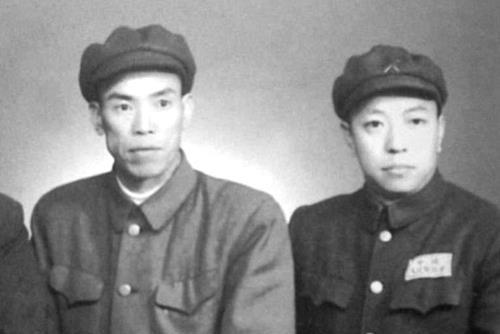Speaking of Liang Xingchu, the "Commander of the Long Live Army", naturally everyone knows that he led the 38th Army to become famous in a war on the Korean battlefield, which shocked the world.
In fact, Liang Xingchu also had a nephew named Liang Biye, who served as the political commissar of the 38th Army, and like Liang Xingchu, he was also a founding lieutenant general.

Liang Biye was born in 1916, 4 years younger than Liang Xingchu, but the uncles and nephews joined the Red Army in the same year, that is, in 1930, when Liang Biye was only 14 years old.
In 1930, after the Red Army conquered the county town of Ji'an in Jiangxi, the people in the city were very happy and warmly welcomed the arrival of the Red Army, and Liang Biye, who followed the crowd, was also very excited and decided to join the Red Army and fight for the poor.
In fact, he did not know at that time, his father was already a secret underground party member, at a joint meeting of party members, his father revealed his identity, Liang Biye was very surprised, and very surprised, he joined the Red Army with his father.
After joining the Red Army, Liang Biye met the most important person in his life: Luo Ronghuan.
At that time, the Red Army was passing through the county seat of Xiajiang To recuperate, and Luo Ronghuan was eating in a shop, and when he saw that Liang Biye was late and had no food to eat, he said, "Young man, come here and eat at my place." ”
(Photo: Luo Ronghuan on the second from the left, Liang Biye on the third from the left)
Many years later, when Liang Biye recalled this scene in those years, he also said excitedly: "Commissar Luo is wearing glasses, his body is big, and he is also the political commissar of the army, I am embarrassed to go to him, and with everyone's encouragement, I just hardened my scalp, shyly replied, walked over, put a chopstick pepper in Commissar Luo's vegetable basin, and quickly ran out." ”
Later, Liang Biye was assigned to work in the office of the political commissar of the Red Fourth Army, and had more opportunities to contact Luo Ronghuan, who later recalled: "Luo Biye was always like a spring breeze, and through his words and deeds, I learned a lot of things and received a lot of education. ”
During the War of Resistance Against Japanese Aggression, Liang Biye spent seven and a half years in Shandong and became Luo Ronghuan's right-hand man. In November 1940, the Yimeng Mountains suddenly encountered the "iron wall encirclement" of the Japanese army, Luo Ronghuan heard the news, immediately launched a breakthrough operation, and finally jumped out of the encirclement, but when they crossed the Menglin Highway, they encountered a greater danger.
It turned out that a large number of Japanese troops in this direction began to march from north to south, and the situation was urgent, and Luo Ronghuan only said one word to Liang Biye: "I have handed over the people of the organ to you!" ”
Liang Biye immediately summoned the main personnel of the organ to take charge of the task of transfer, and he told everyone: "If you encounter a little devil, you must be prepared for a decisive battle!" ”
Fortunately, due to proper deployment and the help of heavy fog, the troops successfully evaded the Japanese army, and when the organ personnel appeared in front of Luo Ronghuan unharmed, Luo Ronghuan patted Liang Biye's shoulder and said: "Good boy, I did not misread you!" ”
At the beginning of the Liberation War, Liang Biye rushed from Shandong to the northeast and served as the political commissar of the first division of the first column of the Northeast Democratic Coalition Army, and the division commander was his uncle Liang Xingchu.
The first annihilation war our army fought after entering the northeast was the Battle of XiushuiHezi, and the opponent was the Kuomintang 13th Army and also the well-known Us Armament Army.
After Liang Biye's encouragement and propaganda, the morale of the officers and men of the unit was high, and all of them handed in their petitions for battle, and Liang Biye said to the deputy division commander Peng Mingzhi with satisfaction: "Old Peng, look at this group of soldiers, we will win this battle!" ”
The soldiers were preparing nervously, and the local people also joined in, some forming stretcher teams to follow behind the troops, and some volunteering to guide the troops.
One day, Liang Biye was studying the battle plan in the headquarters, when suddenly the guards came in to report that there was an old man outside, holding corn in his hand, saying that he was replenishing the soldiers.
Liang Biye put down his work and followed the guards out, and when he saw the old man, he hurried up to meet him and said, "Old man, what are you doing?" ”
The old man said, "I heard that you are going to fight, so I will take these out and mend you." Liang Biye was also not easy to resign, so he let the guards accept it, and after sending the old man away, he said to the guard: "You calculate how much corn you have, replenish the old man, and then bring some nests to the old man." ”
Later, Liang Biye often told this story to everyone, saying: "With such ordinary people, how can we not win?" ”
In 1955, Liang Biye was awarded the rank of lieutenant general along with his uncle Liang Xingchu, and died of illness in 2002 at the age of 86.